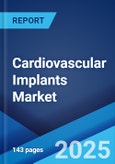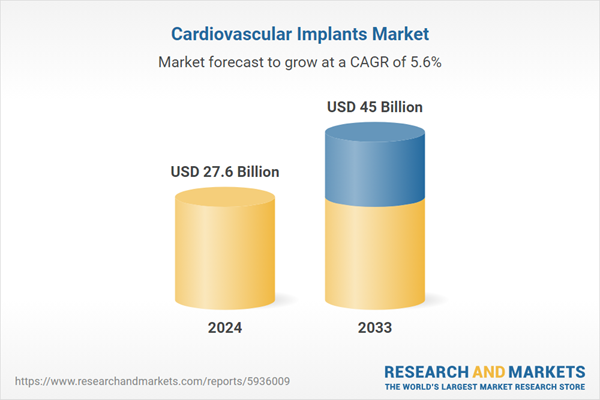Cardiovascular implants are specialized medical tools used to treat various cardiovascular diseases (CVDs), including heart failure, coronary artery disease, peripheral arterial disease, aortic disease, and myocardial infarction. They are fitted inside the body to support the proper functioning of the heart and blood vessels and to alleviate symptoms associated with abnormal heart rhythms. These devices are made from titanium, pyrolytic carbon, silicone, and plastic mesh and are equipped with an implantable cardioverter-defibrillator (ICD) generator and wires that are insulated with polyurethane (PU) polymer. Cardiovascular implants can detect severe heart rhythms and send signals to maintain normal heart function.
Market Segmentation
This report provides an analysis of the key trends in each sub-segment of the global cardiovascular implants market report, along with forecasts at the global and regional level from 2025-2033. The report has categorized the market based on product type, material, procedure type and indication.Product Type Insights
- Coronary Stent
- ICD
- Heart Valve
- Implanted Cardiac Pacemaker
- CRT Device
- Peripheral Stent
Material Insights
- Metals and Alloys
- Polymers
- Biological Materials
Procedure Type Insights
- Angioplasty
- Open Heart Surgery
Indication Insights
- Arrhythmias
- Myocardial Ischemia
- Acute Myocardial Infarction
- Congestive Heart Failure
- Others
Regional Insights
- North America
- Europe
- Asia Pacific
- Middle East and Africa
- Latin America
Competitive Landscape
The report has also provided a comprehensive analysis of the competitive landscape in the global cardiovascular implants market. Competitive analysis such as market structure, market share by key players, player positioning, top winning strategies, competitive dashboard, and company evaluation quadrant has been covered in the report. Also, detailed profiles of all major companies have been provided. Some of the companies covered include BIOTRONIK SE & Co. KG, Abbott Laboratories, AMG International, B. Braun Melsungen AG, Johnson & Johnson Services, Inc., W. L. Gore & Associates, Inc., Medtronic Private Limited, Boston Scientific Corporation, Sorin Corporation, Edwards Lifesciences Corporation, Fortimedix Surgical B.V., Neovasc Inc., CryoLife Inc., Proxy Biomedical Ltd., REVA Medical, LLC., and Shree Pacetronix Ltd.Key Questions Answered in This Report
1. How big is the cardiovascular implants market?2. What is the expected growth rate of the global cardiovascular implants market during 2025-2033?
3. What are the key factors driving the global cardiovascular implants market?
4. What has been the impact of COVID-19 on the global cardiovascular implants market?
5. What is the breakup of the global cardiovascular implants market based on the product type?
6. What is the breakup of the global cardiovascular implants market based on the indication?
7. What are the key regions in the global cardiovascular implants market?
8. Who are the key players/companies in the global cardiovascular implants market?
Table of Contents
Companies Mentioned
- BIOTRONIK SE & Co. KG
- Abbott Laboratories
- AMG International
- B. Braun Melsungen AG
- Johnson & Johnson Services Inc.
- W. L. Gore & Associates Inc.
- Medtronic Private Limited
- Boston Scientific Corporation
- Sorin Corporation
- Edwards Lifesciences Corporation
- Fortimedix Surgical B.V.
- Neovasc Inc.
- CryoLife Inc.
- Proxy Biomedical Ltd.
- REVA Medical LLC
- Shree Pacetronix Ltd.
Table Information
| Report Attribute | Details |
|---|---|
| No. of Pages | 143 |
| Published | February 2025 |
| Forecast Period | 2024 - 2033 |
| Estimated Market Value ( USD | $ 27.6 Billion |
| Forecasted Market Value ( USD | $ 45 Billion |
| Compound Annual Growth Rate | 5.6% |
| Regions Covered | Global |
| No. of Companies Mentioned | 16 |









